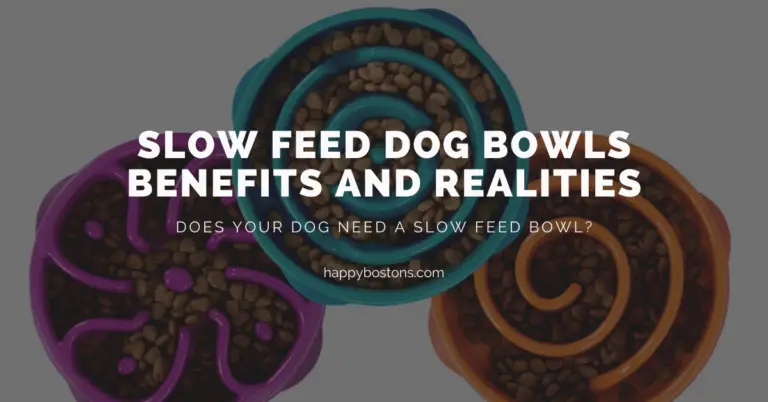How Much Should I Feed My Dog? Tips, Tables & More
Feeding your Boston Terrier is an essential part of their overall health and well-being. Just like humans, dogs require a balanced diet to thrive and maintain optimal health. It is important to pay attention to their nutritional needs to ensure they are getting the right nutrients in the right amounts. Feeding your Boston Terrier the right food can help prevent health issues and promote a long and happy life.
Key Takeaways
- Boston Terriers have specific nutritional needs that should be met through a balanced diet.
- Factors such as age, activity level, and health should be considered when determining how much to feed your Boston Terrier.
- Regular weigh-ins can help you determine if your Boston Terrier is at a healthy weight.
- Feeding your Boston Terrier small, frequent meals throughout the day can help with portion control.
- Choosing high-quality, breed-specific food and avoiding table scraps can help maintain a healthy diet for your Boston Terrier.
Understanding Your Boston Terrier’s Nutritional Needs
Boston Terriers are known for their high energy levels and playful nature. They require a diet that provides them with the energy they need to stay active and healthy. It is important to choose a high-quality dog food that is specifically formulated for small breeds like Boston Terriers. These foods are designed to meet their unique nutritional needs and provide them with the right balance of protein, carbohydrates, fats, vitamins, and minerals.
In addition to their high energy levels, Boston Terriers are also prone to certain health issues such as allergies, obesity, and gastrointestinal problems. Feeding them a balanced diet that is free from common allergens and contains easily digestible ingredients can help prevent these issues. It is also important to avoid overfeeding your Boston Terrier, as obesity can lead to a range of health problems including joint issues, heart disease, and diabetes.
Factors to Consider When Determining How Much to Feed Your Boston Terrier
When determining how much food to feed your Boston Terrier, there are several factors that you need to consider. These include their age, weight, activity level, and overall health. Puppies require more calories than adult dogs due to their rapid growth and development. As they get older, their caloric needs will decrease.
The weight of your Boston Terrier is another important factor to consider when determining how much food to feed them. Overweight dogs may need to be fed less food to help them lose weight, while underweight dogs may need to be fed more to help them gain weight. It is important to monitor your dog’s weight regularly and adjust their food intake accordingly.
The activity level of your Boston Terrier is also an important factor to consider. Dogs that are more active will require more calories to fuel their energy needs. If your Boston Terrier participates in activities such as agility training or long walks, they may need to be fed more food to compensate for the extra calories burned.
How to Determine the Ideal Weight for Your Boston Terrier
Maintaining a healthy weight is crucial for the overall health and well-being of your Boston Terrier. The ideal weight range for Boston Terriers is typically between 10-25 pounds, depending on their size and build. To determine if your dog is at a healthy weight, you can use a body condition scoring system.
A body condition score assesses your dog’s overall body composition by evaluating their muscle tone and body fat. A score of 1-3 indicates that your dog is underweight, while a score of 4-5 indicates that they are at an ideal weight. A score of 6-7 indicates that they are overweight, and a score of 8-9 indicates that they are obese.
It is important to consult with your veterinarian if you are unsure about your dog’s weight or body condition. They can provide guidance on how to help your Boston Terrier reach and maintain a healthy weight.
How Often Should You Feed Your Boston Terrier?
The recommended feeding schedule for Boston Terriers is typically two meals per day. This helps prevent overeating and aids in digestion. It is important to establish a consistent feeding routine and feed your dog at the same times each day.
Puppies may require more frequent meals, as their stomachs are smaller and they have higher energy needs. They may need to be fed three to four times per day until they are around six months old. As they get older, you can gradually transition them to a two-meal-per-day schedule.
It is also important to note that Boston Terriers are prone to bloating and gastrointestinal issues. To help prevent these issues, it is recommended to avoid feeding your dog immediately before or after exercise. Allow them to rest for at least an hour before and after meals to aid in digestion.
The Importance of Portion Control for Your Boston Terrier

Portion control is crucial for maintaining a healthy weight and preventing overeating in your Boston Terrier. It is important to measure your dog’s food accurately and avoid free-feeding or leaving food out all day. This can lead to overeating and weight gain.
To measure your dog’s food accurately, use a measuring cup or scale to ensure you are providing the right amount of food. Follow the feeding guidelines provided on the dog food packaging, but keep in mind that these are just general recommendations. Your dog’s individual needs may vary, so it is important to monitor their weight and adjust their food intake accordingly.
It is also important to avoid feeding your Boston Terrier table scraps or human food. These foods are often high in fat and calories and can lead to weight gain and digestive issues. Stick to feeding them a balanced diet that is specifically formulated for dogs.
Recommended Serving Sizes for Boston Terrier Food
The recommended serving size for Boston Terriers can vary depending on their weight and activity level. As a general guideline, adult Boston Terriers typically require around 25-30 calories per pound of body weight per day. However, this can vary depending on their individual needs.
For example, a 15-pound Boston Terrier that is moderately active may require around 375-450 calories per day. It is important to divide this amount into two meals to prevent overeating and aid in digestion. Puppies and more active dogs may require more calories, while older or less active dogs may require fewer calories.
It is important to monitor your dog’s weight regularly and adjust their food intake as needed. If your Boston Terrier is gaining weight, you may need to reduce their portion sizes. If they are losing weight or not gaining enough, you may need to increase their portion sizes.
When feeding your Boston Terrier, it’s essential to adjust their food intake based on size, activity level, and health needs. Here’s a general guideline to start based on PetMD recommendations:
| Weight Range | Daily Food Intake (Dry Food) |
|---|---|
| Up to 10 lbs | 1/2 to 5/8 cups |
| 11 – 20 lbs | 3/4 to 1 cup |
| 21 – 40 lbs | 1 1/4 to 1 3/4 cups |
| 41 – 60 lbs | 2 1/4 to 3 cups |
| 61 – 80 lbs | 3 to 4 cups |
| 81 – 100 lbs | 3 2/3 to 5 cups |
| Over 100 lbs | 4 1/4 to 6 cups |
Consult your vet for advice tailored to your Boston Terrier’s specific dietary needs.
How to Choose the Right Type of Food for Your Boston Terrier
Choosing the right type of food for your Boston Terrier is crucial for their overall health and well-being. There are several different types of dog food available, including dry kibble, wet canned food, and raw or homemade diets. Each type has its own pros and cons, so it is important to consider your dog’s individual needs when making a decision.
Dry kibble is the most common type of dog food and is convenient and easy to store. It is also typically more affordable than other types of dog food. However, some dogs may have difficulty chewing or digesting dry kibble, especially if they have dental issues or sensitive stomachs.
Wet canned food is another option for Boston Terriers. It is higher in moisture content and can be easier for dogs to chew and digest. However, it can be more expensive than dry kibble and has a shorter shelf life once opened.
Raw or homemade diets are becoming increasingly popular among dog owners. These diets typically consist of raw meat, bones, fruits, and vegetables. While some owners believe that these diets are more natural and provide better nutrition, it is important to consult with a veterinarian or veterinary nutritionist before feeding your Boston Terrier a raw or homemade diet. These diets can be difficult to balance properly and may not provide all the necessary nutrients your dog needs.
When choosing a dog food for your Boston Terrier, look for one that is specifically formulated for small breeds and meets the nutritional guidelines set by the Association of American Feed Control Officials (AAFCO). These guidelines ensure that the food provides a complete and balanced diet for your dog.
Common Mistakes to Avoid When Feeding Your Boston Terrier
There are several common mistakes that owners make when feeding their Boston Terriers. One of the most common mistakes is overfeeding. It can be easy to give in to those pleading eyes and give your dog extra treats or table scraps, but this can quickly lead to weight gain and obesity. It is important to stick to a consistent feeding routine and avoid overfeeding.
Feeding your Boston Terrier table scraps or human food is another common mistake. These foods are often high in fat, salt, and calories, and can lead to digestive issues and weight gain. Stick to feeding your dog a balanced diet that is specifically formulated for dogs.
Not providing enough exercise is another common mistake that can lead to weight gain and other health issues. Boston Terriers are an active breed that requires regular exercise to stay healthy and maintain a healthy weight. Make sure to provide them with plenty of opportunities for physical activity, such as daily walks or playtime in the backyard.
Tips for Maintaining a Healthy Diet for Your Boston Terrier
Maintaining a healthy diet for your Boston Terrier is crucial for their overall health and well-being. Here are some tips to help you keep your dog’s diet on track:
- Feed a balanced diet: Choose a high-quality dog food that is specifically formulated for small breeds like Boston Terriers. Look for one that provides a balance of protein, carbohydrates, fats, vitamins, and minerals.
- Provide plenty of exercise: Regular exercise is important for maintaining a healthy weight and preventing obesity in your Boston Terrier. Make sure to provide them with daily opportunities for physical activity.
- Avoid table scraps: Feeding your Boston Terrier table scraps or human food can lead to weight gain and digestive issues. Stick to feeding them a balanced diet that is specifically formulated for dogs.
- Monitor their weight: Regularly monitor your Boston Terrier’s weight and body condition to ensure they are at a healthy weight. If they are gaining or losing weight, adjust their food intake accordingly.
- Work with your veterinarian: Consult with your veterinarian to develop a personalized feeding plan for your Boston Terrier. They can provide guidance on the right type and amount of food to feed your dog based on their individual needs.
In conclusion, feeding your Boston Terrier a balanced diet that meets their nutritional needs is crucial for their overall health and well-being. It is important to consider factors such as age, weight, activity level, and overall health when determining how much to feed your dog. Portion control is important for maintaining a healthy weight and preventing overeating. Choose a high-quality dog food that is specifically formulated for small breeds like Boston Terriers and avoid feeding them table scraps or human food. By following these tips and working with your veterinarian, you can help ensure that your Boston Terrier stays happy and healthy for years to come.
If you’re wondering how much to feed your dog, you may also be interested in learning about the best Boston Terrier crate size. Having the right crate size is essential for your dog’s comfort and safety. Check out this informative article on Happy Bostons that provides pictures and recommendations for finding the perfect crate size for your Boston Terrier: https://happybostons.com/what-is-the-best-boston-terrier-crate-size-pictures-recommendations/.
FAQs
What factors should I consider when determining how much to feed my dog?
Factors that should be considered when determining how much to feed your dog include their age, weight, activity level, and overall health.
How often should I feed my dog?
Most adult dogs should be fed twice a day, while puppies may require more frequent feedings. It is important to establish a consistent feeding schedule for your dog.
What are some signs that my dog may be over-eating?
Signs that your dog may be overeating include excessive weight gain, lethargy, and digestive issues such as vomiting or diarrhea.
What are some common feeding mistakes that dog owners make?
Common feeding mistakes that dog owners make include overfeeding, feeding table scraps, and not providing enough water.
What are some tips for controlling my dog’s weight?
Tips for controlling your dog’s weight include measuring their food portions, providing regular exercise, and avoiding high-calorie treats and table scraps.
What are some common health problems that can result from overfeeding my dog?
Common health problems that can result from overfeeding your dog include obesity, diabetes, and joint problems such as arthritis.
What are some recommended dog food brands?
Recommended dog food brands include Hill’s Science Diet, Royal Canin, and Purina Pro Plan. It is important to choose a high-quality dog food that meets your dog’s nutritional needs.





![Boston Terrier Itchy Skin [Ultimate Guide]](https://happybostons.com/wp-content/uploads/2021/02/Boston-Terrier-Itchy-Skin-Ultimate-Guide-768x402.png)

